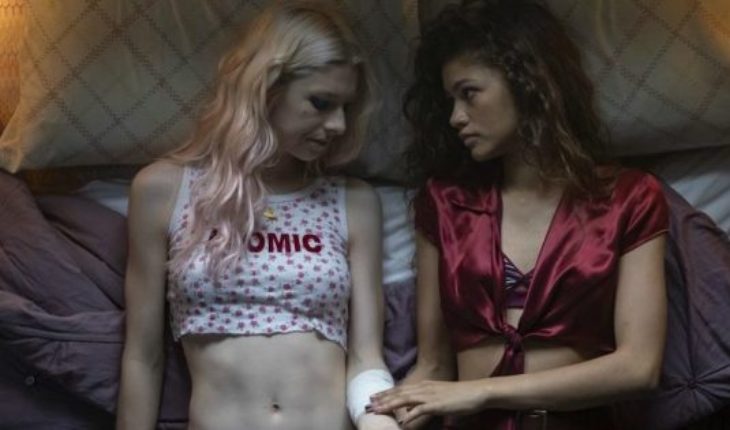The best series I saw in 2019. How to explain it. If you’re not a teenager and you’re old enough to see it, you end up like you get kicked in the face. Anyone who has experienced a similar situation will understand. One after another, episode by episode, come and go, like the waves of Fukushima or the shitty bowls that Mayor Carcetti must drink on The Wire, also from HBO. Honestly, I don’t see my parents enjoying it.
The viewing is intense because of the contrast between the colored lights and a persistent gloom. The scenes use a color palette that hypnotizes like the mobile to the guaguas. They reshine furious violets, fuchsias and celestials that you can’t stop looking at, because among other things, they ring a bell to something we’ve already seen. They are, “the lights of the boats that hurt our eyes.” They’re, “the lights that burn your hands.” There you just fall that you’re looking at your own story because—much earlier—you also had sacrosanct maturity.
Adolescence is a painful metamorphosis, not rhetorical. It’s the transition to the adult body that, from there, goes downhill on the roll. Euphoria goes from that, from change, or rather, of all exchange rates: technological, moral, economic, sexual, among others. But the old ones tend to have a bad memory and the memories of that stage are sweetened by the distance, and the bitterness of living that a Roque Narvaja sang when he wanted to be older.
Because Euphoria knocks you out, sometimes giving juice, babbling conservative morality to understand an explicit scene. “Efectist”, “unnecessary”, “free”, were words I heard when I watched an episode. And yes, so effective, we ended up glued to the screen every Sunday of this winter that was supposed to be devoted to Game of Thrones. Look that I am quite a follower of the English teen subgenre, which is already often exceeded by far. At Skins, Misfits, Chewing Gum or The Inbetweeners, the audiovisual subversion overflows with what we mean by correction. The “it’s not the shapes, it’s not the time,” that Chilean slogan, is never part of his scripts. So, if you think you’ve seen everything, you’ll get a surprise. And the best gift a series can give you is to shudder. That happens here often.
For better or worse, the quality of Euphoria is thankful to Israeli television. And it’s said by a supporter of the “Boycott, Desinitude, Sanctions” (BDS) movement. This is not new, nor is HBO’s trade in capturing the narrative potential of the original series. He did it before with In treatment (BeTipul), as has Showtime with Homeland (Hatufim).
But Euphoria has another factor in his favor, with a first name, and no surname: Zendaya. His performance to give life to a character that oscillates between maturity and that idea that usually inhabits the developing adolescent brain, self-destruction, is frankly superb. Love, sexual self-discovery, drugs, uncertainty, and a lot of mobile phone and the internet, are the cocktail Zendaya drinks from during the eight episodes of the season. Simply masterful. Personally, quite a find.
Euphoria is a series as brutal as it is seductive, as far away as its own. It’s an energetic contradiction like adolescence. And the elders should spend more time understanding that process, let alone criticizing with that arrogant and avinlike superiority that characterizes us. Seeing Euphoria helps to understand the young force behind the Chilean spring. Because this isn’t American Pie, nor is it a breath of fresh air. This is The Zendaya hurricane that came to stay. Long live HBO’s Euphoria (definitely his year). There is a second season in 2020.
May the metamorphosis be eternal.
Claudio Lagos Olivero. @claudiolagoso
The content poured into this opinion column is the sole responsibility of its author, and does not necessarily reflect the editorial line or position of El Mostrador.





